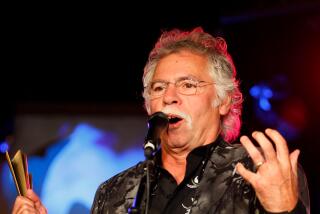Harold W. Arberg Sr. dies at 90; he adapted ‘Caisson’ into Army’s official song
Harold W. “Bud” Arberg Sr., who adapted the “Caisson” into the official song of the Army and who later became director of the arts and humanities division of the Department of Education, died of pneumonia Aug. 4 at a hospital in Arlington, Va. He was 90.
It took the Army three tries and nearly half a century to come up with an official song before Arberg, then a member of the Army’s Special Services Division, got it right. The Navy, Marine Corps, Air Force and Coast Guard all had their official songs, and the Army sang what might have been the best-known military song of all: “Over hill, over dale, we have hit the dusty trail, as our caissons go rolling along.” But “The Caissons Go Rolling Along,” written in 1908 by then-1st Lt. Edmund “Snitz” Gruber, never received official status.
Toward the end of World War I, composer and bandmaster John Philip Sousa added a few introductory measures to Gruber’s piece and renamed it “The U.S. Field Artillery March.” Sousa’s version became a huge hit, although it never became official, in part because the lyrics referred to the field artillery and not the Army as a whole.
The Army resumed its search for a song in the late 1940s, about the time Arberg was serving as an Army musician in Iran. In 1948, he became a reserve officer at Ft. Monmouth, N.J.
“An all-Army song contest the previous year had produced five new songs, including one by Vaughn Monroe, the popular bandleader and singer,” Arberg told Army Times in 2003. “They were well-crafted songs, but none inspired much response from soldiers or the general public.”
Arberg returned to active duty in 1951 and was assigned to the Pentagon. As the new musical officer, he was summoned by Lt. Col. Bryce Denno, military aide to Army Secretary Frank Pace. “He’s tired of going to functions where ‘Anchors Aweigh’ and the Air Force and Marine songs are played, when there is no Army song,” Arberg said Denno told him.
Arberg began looking for songwriters interested in taking on the mission. He talked to Sam Stept, the prolific songwriter who co-wrote the popular wartime hit “Don’t Sit Under the Apple Tree” (1942). Stept came up with what Arberg labeled “a rousing marching song,” called “The Army’s Always There.” Unfortunately for the composer, too many people confused it with “I’ve Got a Lovely Bunch of Coconuts,” a well-known English song, and the Army shelved it in 1953.
In 1956, new Army Secretary Wilbur Brucker decided the Army should adopt the old standard, “The Caissons Go Rolling Along.” Arberg wrote new lyrics (“First to fight for the right, and to build the nation’s might, and the army goes rolling along”) and a new musical introduction, and on Veterans Day 1956 Gruber’s “Caisson” song became “The Army Goes Rolling Along,” the official song of the U.S. Army.
Harold Walton Arberg was born Aug. 19, 1918, in Brooklyn, N.Y. After receiving a bachelor’s in music from Princeton University in 1940, he served in the Army’s Persian Gulf Command during World War II, writing and conducting musical shows. He received a master’s in 1948 and a doctorate in 1951, both in education from Columbia University.
After returning to active duty during the Korean War, his Special Services assignments included seeking ways to inspire soldiers through barbershop harmonizing.
After a decade on active duty, he was named head of the cultural affairs branch of the U.S. Office of Education. Later, as director of the arts and humanities branch of the Office of Education, one of his aims was to assimilate the arts into the regular public school curriculum.
He retired from the Department of Education in 1983.
Survivors include his wife of 68 years, Jane Phillips Arberg of Arlington; four children, Harold W. Arberg Jr. of Martinsburg, W.Va., Phillips A. Arberg of Las Vegas and Charles S. Arberg and Robert C. Arberg, both of Alexandria, Va.; eight grandchildren; and a great-granddaughter.
Holley writes for the Washington Post.
More to Read
Start your day right
Sign up for Essential California for the L.A. Times biggest news, features and recommendations in your inbox six days a week.
You may occasionally receive promotional content from the Los Angeles Times.






